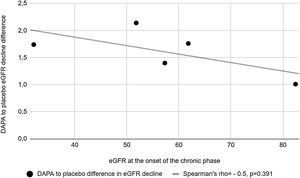In their recently published letter, Gippini and Prado1 present an analysis of the renal benefits of earlier introduction of dapagliflozin. Although their idea is original, I think some remarks would be beneficial when drawing conclusions. First of all, the external validity of the findings is limited since the included studies are not the result of a systematic review, which make the results susceptible to evidence selection bias,2 and since the basal characteristics of patients in each study are not presented, which makes the research question imprecise. Additionally, the calculations the authors present deserve some considerations.
First, an assumption is made that the difference between the decline rates of the estimated glomerular filtration rate (eGFR) in patients treated with dapagliflozin or placebo is constant through time. We do not have evidence supporting this assertion, but in the DAPA-CKD trial3 the slopes of the eGFR vs time curves were different between the two groups. From the data presented in the letter,1 as we will see, the eGFR decline ratio is different throughout the different values of eGFR reserve.
Second, they oppose the “time to end-stage kidney disease” to the eGFR at the beginning of the so-called chronic phase,1 which is calculated by dividing these eGFR values, −15ml/min/1.73m2, by the difference in the eGFR decline between patients with dapagliflozin and placebo in each study.1 Since the main comparison in this study is a variable against itself divided by a second variable – in other words, there is no independent and dependent variable–, whatever differences are observed are due to that second variable, the difference between the worsening eGFR rates, which is the truly independent variable. Thus to see if the benefit of dapagliflozin depends on the eGFR at the start of treatment, we should assess the correlation between those two variables (Fig. 1). In this case, we do not find an association between the basal eGFR and the renal benefit of dapagliflozin (Spearman's rho=−0.5, p=0.391).
Having all this into account it can be hazarded that patients who initiate dapagliflozin, and probably other sodium-glucose cotransporter-2 inhibitors (SGLT2i), earlier have a longer time to perceive its benefits, but the nephroprotection provided by these agents does not appear to change with the kidney functional reserve. This is, to my judgement, a positive finding as well, since it confirms that all patients in the chronic kidney disease spectrum can potentially benefit from SGLT2i treatment. A patient-level meta-analysis including all SGLT2i agents could help answer the original question.
FundingNo funding was received for the elaboration of this manuscript.
Conflict of interestThe author has no conflict of interest to disclose.







